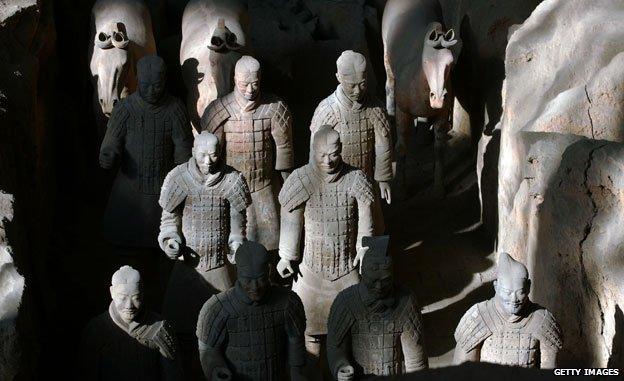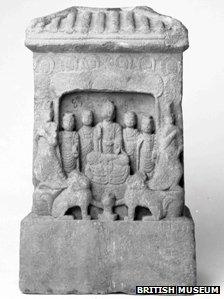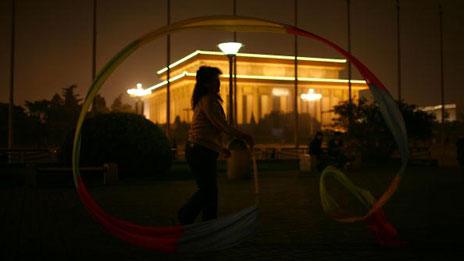Qin Shi Huang: The ruthless emperor who burned books
- Published

There are two Chinese leaders whose final resting place is thronged by tourists - Mao Zedong and Qin Shi Huang, the emperor of terracotta soldier fame. But they also have another thing in common - Qin taught Mao a lesson in how to persecute intellectuals.
Chairman Mao Zedong has been dead for nearly 40 years but his body is still preserved in a mausoleum in Tiananmen Square.
The square is the symbolic heart of Chinese politics - red flags and lanterns flank the portrait of Mao on Tiananmen Gate where he proclaimed the People's Republic in 1949.
But the red emperor owed the idea of this vast country to an empire builder who lived 2,000 years earlier.
"We wouldn't have a China without Qin Shi Huang," says Harvard University's Peter Bol. "I think it's that simple."
China at the time was a land of many states.
In many ways - climate, lifestyle, diet - someone from northern Scotland and southern Spain have as much in common as someone from China's frozen north and the tropical south.
Before Qin, China's multiple states were diverging, rather than converging, says Bol.
"They have different calendars, their writing was starting to vary… the road widths were different, so the axle width is different in different places."
He was king of the small state of Qin by the age of 13, and started as he meant to go on - removing one possible threat to his throne by having his mother's lover executed, along with his entire clan.
A hundred years later the famous historian Sima Qian said of the young king:
"With his puffed-out chest like a hawk and voice of a jackal, Qin is a man of scant mercy who has the heart of a wolf. When he is in difficulty he readily humbles himself before others, but when he has got his way, then he thinks nothing of eating others alive.
"If the Qin should ever get his way with the world, then the whole world will end up his prisoner."
Qin Shi Huang built a formidable fighting machine. His army is easy to imagine because he left us the famous terracotta warriors in Xian.
"The Qin was really the first state to really go into total mobilisation for war," says Peter Bol.
"It really saw the work of its population being fighting and soldiering to win wars and expand."
One by one, Qin Shi Huang defeated neighbouring states, swallowed their territory into his growing empire and enslaved and castrated their citizens.
"Every time he captured people from another country, he castrated them in order to mark them and made them into slaves," says Hong Kong University's Xun Zhou.
"There were lots and lots of eunuchs in his court. He was a ruthless tyrant."
But still, no Qin, no China.
"From Mongolia down to Hong Kong, and from the sea right the way across to Sichuan - it's an enormous territory," says Frances Wood, curator of the Chinese collection at the British Library.
"It's the equivalent of the whole Roman Empire added together, if you like. And you've got one man ruling all of it."
Peter Bol credits Qin Shi Huang not only with creating China, but with establishing the world's first truly centralised bureaucratic empire.
"He set out to unify the procedures and customs and policies of all the states," says Bol.

Stelae are found at many significant mountains and historical sites in China
"Writing is reunified. And the fact that Chinese writing remains unified after this point has everything to do with Qin Shi Huang. The axle widths are now all the same, so all the roads may now be passable.
"He also goes around to famous mountains, where they erect steles, stone monuments, which say that the Emperor's realm is now totally unified.
"His idea was that every area should have an able administrator, who was armed with rule books and who would look after the people. The people all knew what the rules were," says Wood.
"He collected taxes, he administered justice and he had trained bureaucrats all over China. I think that's an extraordinary achievement."
Despite this, it is the stories of his bloodletting that historian Xun Zhou grew up with.
"He got rid of anybody who showed opposition or didn't agree with him. He was paranoid. He was constantly in fear of how he could control this vast new territory with so many cultures and so many different groups of people," she says.
And he feared the inkbrush as much as the sword.
"The scholars were talking behind his back," says Xun Zhou. "And of course being a paranoid person, he didn't like that. So he ordered the arrest of over 400 scholars and buried them."
Qin Shi Huang had no truck with China's traditions of Confucian scholarship - his fear of the intellectual was deep-rooted.
"Ideologically speaking, the Qin make the argument, 'We don't want to hear people criticise the present by referring to the past,'" says Peter Bol.
"The past is irrelevant. History is irrelevant. And so you have the burning of books, you have the burying of scholars, of scholarly critics."
Bol sees parallels with today's China. Like Qin Shi Huang, the Communist Party tolerates debate about tactics - but not about the general direction of travel, he says.

Every night Mao's coffin reportedly travels in a lift to an underground bunker
"They argue that it is the only possible approach to governing China."
Historian Xun Zhou agrees. "In Communist China, we adopted the imperial model. The emperor is absolute. And the only way to rule such a vast empire is ruthlessness," she says.
In fact in 1958, Mao himself made the connection between himself and Qin Shi Huang.
"He buried 460 scholars alive - we have buried 46,000 scholars alive," he said in a speech to party cadres. "You [intellectuals] revile us for being Qin Shi Huangs. You are wrong. We have surpassed Qin Shi Huang a hundredfold."
Every night, Mao's body inside its crystal coffin reportedly goes down into its earthquake-proof vault in an elevator, and every morning it is brought back up again.
It is probably something Qin Shi Huang would have appreciated. But I am not sure he would have been impressed with Mao's mausoleum.
His includes a life-size terracotta army, a full orchestra with instruments and a river landscape with cranes, swans and geese - and archaeologists have barely begun the excavation.
"In a sense the man has disappeared behind the tomb," says Frances Wood.
"And of course the size of the buried army, the size of the tomb enclosure - which seems to expand daily - does rather overcome anything that one knows about him in reality. You've got this great physical presence now."
Both Qin Shi Huang and Mao live on powerfully in China's imagination, but China is bigger than its emperors.
When Qin Shi Huang died, his dynasty lasted only months. It was the idea of China which survived. And when Mao died, his successors said the radiance of his thought would live forever.
But the Mao suits are gone and despite the crowds at his mausoleum, Maoism is barely mentioned today.
Translation of Records of the Grand Historian by Burton Watson.